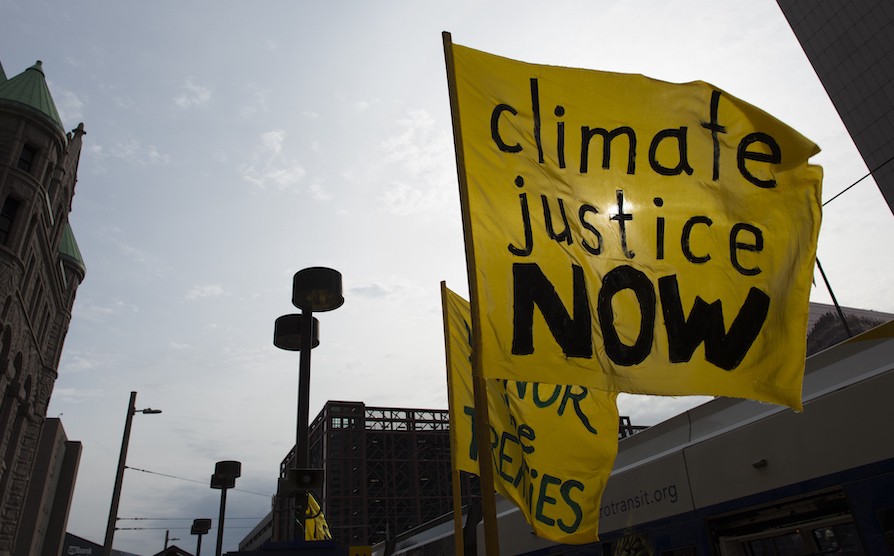
In a politically divisive procedural vote yesterday, the Senate voted against the Green New Deal resolution, which since its introduction in February has stoked heated debate over feasibility, policy details, and financing.
But last night’s vote shouldn’t be a roadblock to the bold climate policy needed to implement a just transition towards a clean environment and economy. What the media frenzy and public debate over the resolution have ignored is the existence of a strong policy mechanism — public purchasing — that we could use to deliver on core aspects of Green New Deal and lift up working people across the country.
Our government’s total public purchasing rings in at approximately $2 trillion per year — that’s massive purchasing power — and includes spending on everything from textbooks and software to buses and trains.
Typically, public purchasing policies guide our cities and states to award contracts to the companies offering the “lowest cost” bid. As a result, public agencies are not incentivized to consider other benefits, such as job creation and quality.
This cost-effective status quo on public purchasing represents a missed opportunity. With the $2 trillion in taxpayer dollars we spend yearly, our government has the power to make purchases that set high standards — and hold corporations accountable to them.
Cities and states need to use public purchasing as a mechanism to create high quality jobs, set rigorous climate standards, and spur innovation in clean energy technologies. In doing so, we can harness the public dollars we already spend to flow economic and environmental benefits back into our communities. Whatever you call this approach — “purchasing for the common good” or just plain old good government — it’s a tool we could be using right now to build critical climate infrastructure while creating good jobs for working people.
Some cities are already waking up to the power of their public purchasing policies. At Jobs to Move America, our coalition of labor and community groups worked with Los Angeles’s public transit agency, LA Metro, to pass a “purchasing for the common good” policy called the U.S. Employment Plan that now applies to the billions of public dollars LA Metro spends purchasing trains, buses, and transit equipment.
With the recognition that investing in clean-powered public transit is crucial to reducing greenhouse gas emissions, this policy at LA Metro ensures that the manufacturing companies building LA’s transit equipment are committed to creating high-road jobs. Combined with California’s recent mandate that the state’s transportation agencies electrify all bus fleets by 2040, this policy could support the creation of up to 20,000 good, clean jobs.
In Chicago, JMA worked with the Chicago Transit Agency (CTA) to apply the U.S. Employment Plan to a recent purchase of up to 846 railcars. As a result, the CTA helped create hundreds of good jobs at a new railcar factory on Chicago’s Southeast side, which were targeted to workers who face barriers to employment, including formerly incarcerated people, single parents, and veterans.
As more cities and states weigh legislation to transition their economies away from fossil fuels, “purchasing for the common good” policies ensure that every dollar spent on clean-powered infrastructure results in good jobs and real benefits for our communities. In Illinois, where the general assembly is considering a bill that would set aggressive decarbonization targets and invest $20 billion in new clean infrastructure, adopting the U.S. Employment Plan would give the state an enforceable mechanism to ensure investments in wind turbines and solar panels create good jobs for workers transitioning out of high-carbon industries.
The good news is we don’t need to wait. We’re working to make the Green New Deal a reality by building strong coalitions of labor, community, and environmental groups to advocate for “purchasing for the common good” policies. Together, we can create family-sustaining jobs and a climate-safe world for future generations — and we can do it now.
Sophia Reuss is Jobs to Move America’s communications specialist based in New York.
Image: Fibonacci Blue/Flickr
